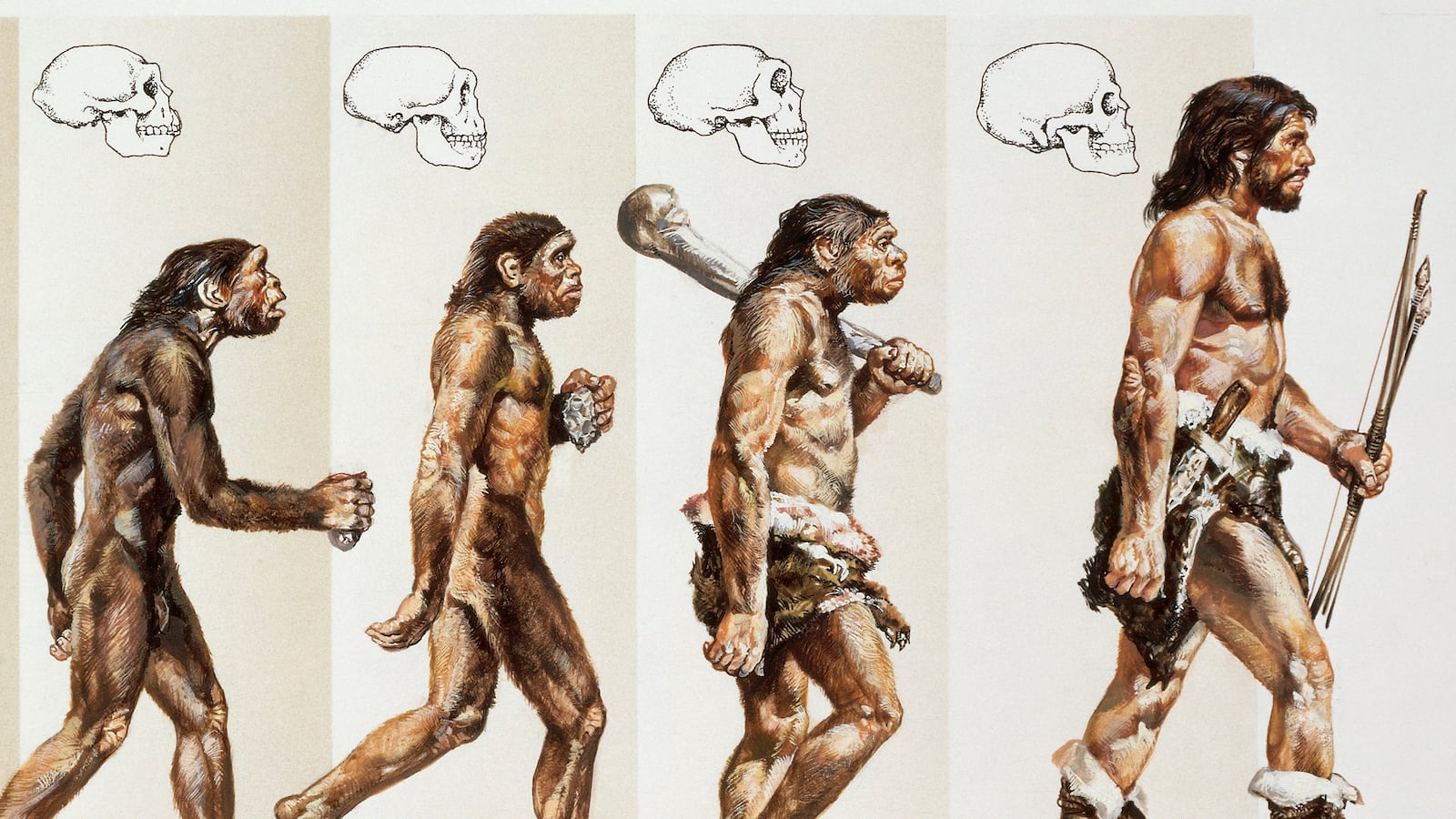Evolution did not fare well in 2013. The year ended with the anti-evolution book Darwin’s Doubt as Amazon’s top seller in the “Paleontology” category. The state of Texas spent much of the year trying to keep the country’s most respected high school biology text out of its public schools. And leading anti-evolutionist and Creation Museum curator Ken Ham made his annual announcement that the “final nail” had been pounded into the coffin of poor Darwin’s beleaguered theory of evolution.
Americans entered 2013 more opposed to evolution than they have been for years, with an amazing 46 percent embracing the notion that “God created humans pretty much in their present form at one time in the last 10,000 years or so.” This number was up a full 6 percent from the prior poll taken in 2010. According to a December 2013 Pew poll, among white evangelical Protestants, a demographic that includes many Republican members of Congress and governors, almost 64 percent reject the idea that humans have evolved.
The connection between acceptance of evolution and political affiliation has grown stronger over the past three years, exacerbating the polarization now plaguing Congress. Among Democrats, acceptance of evolution increased by 3 percent, to 67 percent, while among Republicans it decreased from 54 percent to 43 percent.
The trajectory is not encouraging, especially as it runs in parallel with a steady increase in the evidence for evolution—evidence now piled so high that not even one evolutionary biologist at any of America’s research universities rejects the theory. Evolution is as widely accepted in biology departments as gravity is in physics departments.
So how is it that 64 percent of America’s “white evangelical evangelical Protestants,” an unusually powerful and wealthy demographic, remains so strongly opposed to evolution?
I am a white evangelical Protestant, or at least I was until persuaded to leave a couple of years ago. Raised in a parsonage, I grew up in that tradition and, after earning a Ph.D. in physics, I taught science, including evolution, at an evangelical college, one of approximately 160 similar—and accredited—institutions in the Council of Christian Colleges and Universities (CCCU). Most evangelical colleges teach evolution, albeit quietly, carefully, and often tentatively, although there are exceptions. And almost all public schools, of course, are required by law to teach evolution. In an ideal world these efforts should slowly trickle onto Main Street, where they would inform ordinary evangelicals, including those who run for Congress. In time, Darwin’s dangerous idea should become widely accepted, just as Christians gradually gave credence to Galileo’s dangerous idea about the motion of the earth.
But that is not what is happening.
For a quarter century I taught scientific theories of origins—evolution and the Big Bang Theory—under a cloud of suspicion that waxed and waned but never totally disappeared. With few exceptions, my mostly evangelical students accepted these ideas. I took informal polls indicating that most of the 50 percent of my students who rejected evolution at the beginning of my course accepted it by the end. My colleagues at other evangelical colleges report similar experiences. We were hopeful that these evangelical students would become leaders of their faith communities and gradually persuade their fellow evangelicals that evolution was not a lie from hell—which was what many of them had been taught in Sunday school. But instead scientifically informed young evangelicals became so alienated from their home churches that they walked away, taking their enlightenment with them.
An alarming study by the Barna group looked at the mass exodus of 20-somethings from evangelicalism and discovered that one of the major sources of discontent was the perception that “Christianity was antagonistic to science.” Anti-evolution, and general suspicion of science, has become such a significant part of the evangelical identity that many people feel compelled to choose one or the other. Many of my most talented former students no longer attend any church, and some have completely abandoned their faith traditions.
Viewed from “outside,” the phenomenon alarms and even enrages church leaders. Children are nurtured carefully in their faith through Sunday school, church, summer programs, and at home—and are then sent to expensive private evangelical colleges with the expectation that this faith will be protected as the children mature into well-educated adults. But often students are educated out of their childhood faith and even into no faith at all—at a cost of $40,000 a year. That is a disaster of the first magnitude, as it implies, in the theology of most evangelical parents and leaders, that their children have lost their salvation and will spend eternity in hell if they don’t recover their faith.
That may sound like hyperbole, but it is not. Henry Morris, the leading anti-evolutionist of the 20th century, made the same argument in his influential book The Long War Against God: The History & Impact of the Creation/Evolution Conflict. Such theological thinking explains why Darwin is linked to Hitler, our greatest symbol of evil, by most creationist leaders and even the supposedly more enlightened “intelligent design” theorists at the Discovery Institute. It was what Rep. Paul Broun (R-GA)—who was on the House Science, Space, and Technology Committee at the time—meant when he called evolution and the Big Bang “lies straight from the pit of hell.”
Those of us teaching evolution at evangelical colleges are made to feel as if we have this subversive secret we must whisper quietly in our students’ ears: “Hey, did you know that Adam and Eve were not the first humans and never even existed? And that you can still be a Christian and believe that?” Such an approach works surprisingly well, at least in persuading young people that evolution is true and compatible with their faith, as long as it occurs in the quiet intellectual confines of the classroom, where the subversive message is delivered by caring and thoughtful Christian professors.
But some professors, alarmed by the persistent gap between the evangelical community and the findings of science—the gap that drives their students out of their churches—have naively presumed to educate their larger faith communities by writing books and articles in support of scientific theories of origins such as evolution and the Big Bang. Their quiet whispers thus become loud proclamations. Influential leaders read their books and are horrified to discover that a faculty member at “their” college is spreading “lies from the pit of hell” and destroying the faith of the students. Campaigns of various sorts are mounted and pressure exerted on the college leadership to remove that dangerous professor.
That was my life for my last 15 years as a faculty member at Eastern Nazarene College in Quincy, Massachusetts, after my books, articles, and lectures made me the focus of fundamentalist rage. Productive scholarship that would be highly valued at other institutions became instead a major liability. Administrators complained that I was too controversial and creating public relations problems—not because they disagreed with what I said but because I was no longer just whispering it quietly in the classroom. Youth pastors informed the admissions office at the college that they were discouraging students from attending the college because it promoted evolution. Affiliated churches withheld financial support. Donors went elsewhere with their money.
I spent countless hours in the office of a succession of college presidents, explaining why Christians needed to make peace with evolution, no matter how painful. I was forced to communicate and even meet with hostile external constituents to defend well-established science against people who knew nothing about it beyond the challenges it posed to their interpretation of the Bible. One such watchdog group, the Reformed Nazarenes, rejoiced when I finally left the college.
My story is far from unique. Indeed, it’s almost typical. Understandably, only a handful of evangelical scholars have published books and articles in defense of evolution, but many of them have been forced to resign as a result. Howard Van Till and John Schneider were both forced out of Calvin College. Richard Colling was forced out of Olivet Nazarene University. All three had decades of exemplary service. Many others were silenced or censured. In all cases the crises were precipitated when external constituencies put pressure on the institutions to remove an otherwise excellent professor. In no case did the problem arise from within the institution itself.
Truth, alas, seems to resemble a commodity at such institutions, to be purchased by the highest bidder or the most powerful political leader. Accepting evolution and teaching it to students are entirely acceptable until some powerful constituency says they are not.






